#i'm so insane about the use of it to indicate his general mental state
Explore tagged Tumblr posts
Text
the fucking,, the reoccurring use of miles sticking to things or breaking stuff when he's feeling nervous and that it's used as an indicator of how he's feeling,,, i'm so normal about this movie i promise
#(im lieing)#and it's used all the time like when he's taking to gwen and puts his hand closer to hers and his hand sticks to his pants#and on the train in miguel's universe he jumps from the that train that's going up thing and rips some of the metal off letting go#head in hands head in hands#i'm going to lose it it's so good#it was one of my favorite details of into the spiderverse and is one of my favorites in across the spiderverse#i'm so insane about the use of it to indicate his general mental state#fcukin incredible#miles morales#spiderman#spiderman across the spiderverse#spiderman into the spiderverse#spiderman spoilers#across the spiderverse spoilers#across the spiderverse#mine
230 notes
·
View notes
Note
is there any text or tumblr post that dives into the ways in which sir lancelot is insane? like a freak? i’ve read a couple extracts ab him giving the idea that he was effed up a bit and like a whole murderbot with raging feelings of hatred and love? i would like to know more ab the crazy things he does or says that make ppl go “this man is a freakazoid”. also i adore your blog thank you for making sumn this nice!
hi there!
i'm unsure if you mean excerpts from medieval sources in which lancelot is "mad" or academic articles dissecting those instances...but i have both for you lol now a disclaimer: i'm neither a medievalist nor a psychologist, so all i can offer you is the raw material and my opinion. while we shouldn't "diagnose" anyone of the past as we do now, lancelot isn't a real person, so i think that affords us a little more freedom to speculate about him, and more importantly, what it is he represented: a medieval anxiety surrounding trauma and the resulting mental toll. info and sources below a cut. huge content warning for self harm and suicidal ideation.
Academic Sources: Medieval Attitudes Towards Mental Illness by Edith A. Wright, Of Metal and Men by Julie Singer, The Enemy Inside by Brian Burfield
Medieval Sources: The Knight of The Cart by Chréiten de Troyes, The Vulgate Cycle edited by Norris J. Lacy
so for starters, let's establish what it is people are responding to when they discuss lancelot's mental instability. the character first appears in "the knight of the cart" by chrétien de troyes, and right from the getgo, lancelot exhibits a lot of mental distress, up to and including, a suicide attempt.

from his inception, lancelot was unwell. at another point, he appears to disassociate so completely, he forgets his own identity, and loses perception of his body.
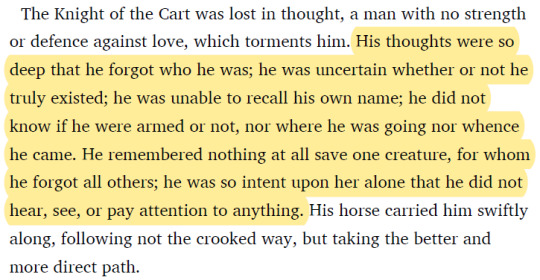
now you may have noticed that the text always links lancelot's episodes to his fixation on guinevere. we'd be here forever if we incorporated the way medieval authors offset the blame of their protagonists' deteriorating mental states onto the fault of a woman (see also: yvain/owain's madness when laudine/countess divorced him, tristan's madness out of longing for isolde, etc.) whereas when a woman shows upset, it's never attributed to her lover, but a shortcoming within herself. so for the sake of staying on topic, we'll focus on lancelot's symptoms as they are, rather than trying to unravel the middle ages-sized knot of misogyny that is the fictitious root of these madness episodes. "medieval attitudes towards mental illness" by edith a. wright discusses this trend in depth.
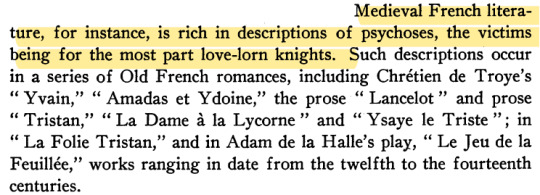
i'm going to be focusing on "the vulgate cycle" as my main source of lancelot's madness as he has multiple distinct episodes in that text written in excruciating detail that we can discuss. generally speaking, lancelot is presented as an extremely anxious individual that's highly susceptible to outside influence (whether that be guinevere's, galehaut's, etc.) but that in and of itself is not necessarily indicative of mental illness so much as a rarely explored introverted quirk of his personality. as discussed in "of metal and men" by julie singer, it seems lancelot's at his most confident when operating as an anonymous knight and therefore not subject to the scrutiny of societal expectation.

this, however, can develop in extreme ways when lancelot is pushed past his limits, and he succumbs to a berserker-like state neither his friends nor family can shake him from. while imprisoned at saxon rock, lancelot has to be segregated from the other prisoners, despite galehaut begging to be housed with him, the jailers refuse as lancelot's psychosis is so intense that he'd kill his fellow hostages and thus neutralize the enemy army's advantage. lancelot's refusal to eat exacerbates his symptoms. [Lancelot Part II, Ch. 71. Lancelot’s Madness and Cure; Defeat of the Saxons and Irish; Lancelot, Galehaut, and Hector Become Companions of the Round Table]

this psychotic episode continues even after lancelot is freed. eventually guinevere is forced to lock him alone in a room to protect the others, as he continues to attack anyone who comes near, including his own younger cousin and squire lionel who had attempted to talk him down and was struck. lancelot only recovers after his adoptive mother, the lady of the lake, arrives and utilizes strikingly modern de-escalation techniques, such as referring to lancelot by his childhood name to ground him, administering some medicine to help him sleep, allowing him uninterrupted rest, and then bathing him. (this is tinged with medieval mysticism, of course, but you get the idea.) the lady of the lake then instructs guinevere on how to care for him thereafter. once lancelot awakens from his magic/healing-induced coma, his sanity is restored.

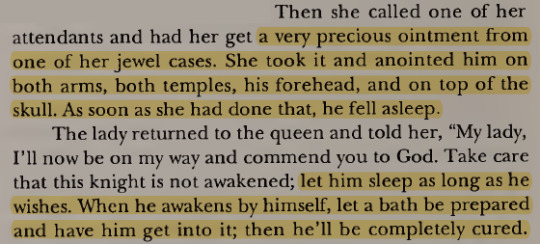
it feels important to note here that, once lancelot regains his senses, he feels ashamed of his behavior, and worries that his mental instability would cause guinevere to love him less. but she assures him that she loves him and is committed as long as they both live. even in medieval times, people recognized that a strong support system was of utmost importance for the mentally ill to thrive.

lancelot is, for the most part, stable for a time after this, contented to live at sorealis with galehaut (and guinevere for a bit as well). but growing restless, lancelot leaves galehaut's company to go adventuring. through some misunderstanding, galehaut believes lancelot had died, and thus dies of heartbreak himself. on discovery of his beloved's tomb, lancelot grieves so bitterly that he intends to kill himself on the spot. [Lancelot Part IV, Ch. 120. Lancelot Discovers Galehaut’s Casket and Defends It; Lancelot Rescues Meleagant’s Sister]


it's here that a messenger of the lady of the lake arrives. the lady had been informed by her oracle that this would happen, so acting quickly, she sent someone to intervene. the messenger takes the sword from lancelot and immediately gives him a task, one that would exhume galehaut and bring his body to where lancelot would eventually be buried beside him. in the short term, this prevented lancelot from harming himself, and in the long term, guided him toward shifting gears long enough that he eventually overcomes his grief through completion of his lady's instruction.
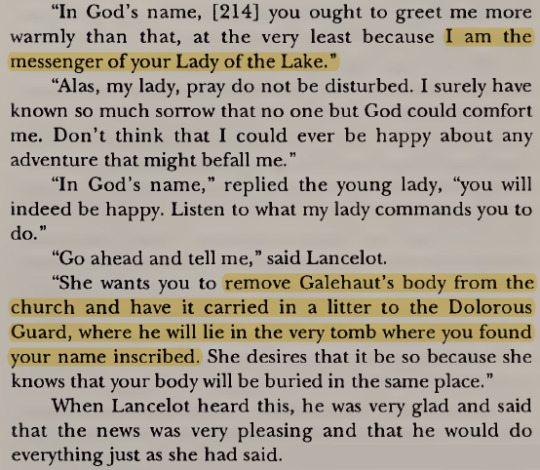
the next time lancelot is driven mad is after he is beguiled by elaine of corbenic into bed with her at camelot. (this is the second time, galahad had already been conceived). [Lancelot Part VI, Ch. 176 Lancelot and Arthur Go to Gaul; Claudas Abandons Gaunes; King Pelles’s Daughter Deceives Lancelot; Guenevere Expels Lancelot]
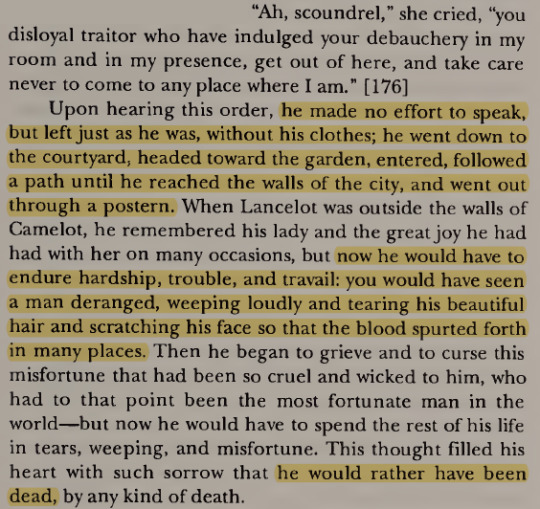
at this point, lancelot is beyond the reach of even his mother, the lady of the lake, so this psychotic episode persists for many years. he's declared missing and all of the knights set out in search of him, to no avail, and he is assumed dead. lancelot, meanwhile, survives the winter by attacking people and stealing their resources. [Lancelot Part VI, Ch. 178 Lancelot’s Madness and Subsequent Cure]


eventually, while lancelot is subdued in a deep sleep, a pair of charitable brother knights, recognizing that lancelot is unable to care for himself and a danger to those around him, successfully transport him to their castle. they don't know who he is. they keep him chained for safety but feed and clothe him. during this time, lancelot mutilates himself to be free.
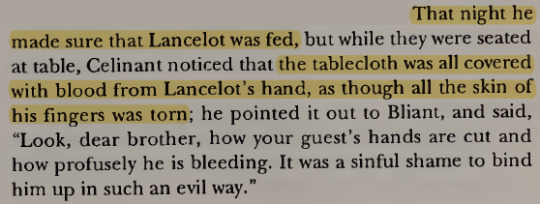
eventually, lancelot is calm enough to be freed from his bindings, and lives with the brothers in this way for two years. he eats little and completely loses touch with his identity and the reality of the world around him.
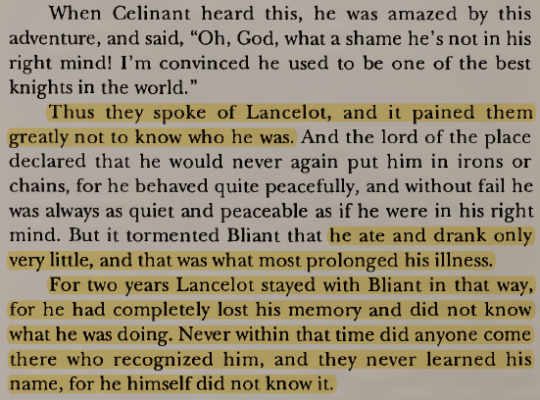
but one day, lancelot looks out his tower window and sees a passing boar. he's compelled to follow it and departs the castle of the brothers without a word. he ends up in a battle with the boar which he barely survives. a holy man happens upon him and tries to administer healing, but lancelot attacks him.
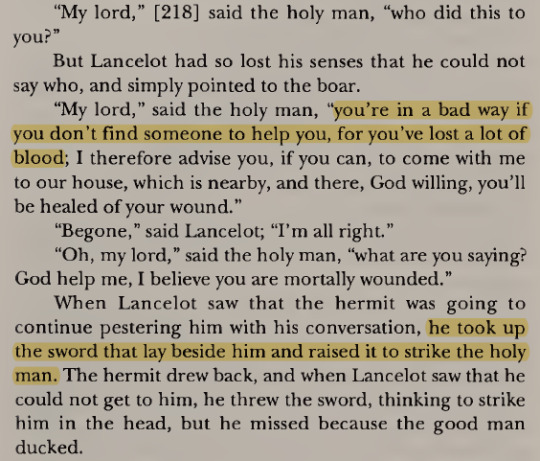
after this the holy man flees and enlists the help of some men-at-arms, who assist in capturing lancelot and forcibly strapping him to a litter to be drawn away. ultimately, despite the best intentions, lancelot's condition only worsens.
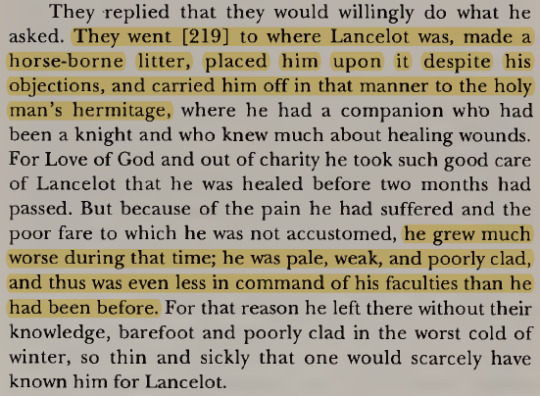
i'm going to make a brief aside here as this reminds me of an article i read detailing a similar situation which occurred in real life. in "the enemy inside" by brian burfield, john of ancaster suffered mental distress as a result of the war in france, subsequently inflicting harm on himself and others. in this case, it was his father that restrained him into a horse-drawn cart, and brought him to a place of healing which was revolutionary of the time period, as friar bartholomeus recognized the connection between trauma and mental distress without attributing it to demonic possession, thus attracting many people in need of help to his monastery for treatment. so there is, at least in part, historical precedence of similar occurrences.

anyway, back to lancelot. he eventually flees from his intended caretakers yet again and wanders to the town of corbenic. there the children recognize his madness and begin to harass him, throwing stones and sticks, until he's incited to retaliate and wounds anyone who crosses him. eventually he wanders into the castle itself. the courtlings recognize he's mad, and feed him scraps. satiated, he literally curls up and sleeps on the floor like a dog. it's this, at last, that allows him to begin the slow recovery to wellness.

finally, after all these years, someone recognizes lancelot for who he is. none other than elaine of corbenic.

she tells her father pelles and he concocts a plan to capture and cure lancelot using the power of the holy grail. so as the times before, they wait until lancelot falls asleep, and bind him up. then at long last, his senses are restored.

when lancelot awakens from his stupor, he knows not how he got there, but begins walking upright and talking coherently again. he implores pelles to explain how he came there. once up to speed. lancelot is grateful no one but pelles and elaine recognized him. now let it be made clear that while lancelot's psychotic episode had finally concluded, he's not otherwise alleviated of mental anguish. he's still depressed about his banishment from logres and camelot, and deeply ashamed of his many years spent mad. thus he requests of pelles to live somewhere far away, where no one but pelles and elaine will ever recognize him.
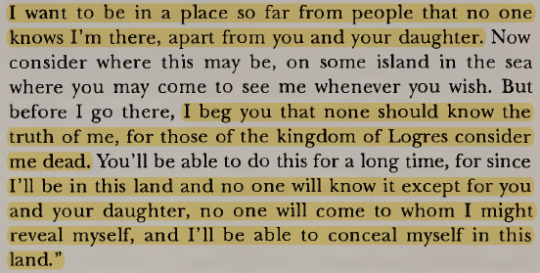
so an island with a castle is located on which lancelot can live and he, together with elaine and a small court, go there to stay. lancelot loses his knightly abilities and instead takes up the daily ritual of subjecting himself to painful memories of logres, which then in turn bring him "relief" and "comfort". an apt description of rumination and self harm.
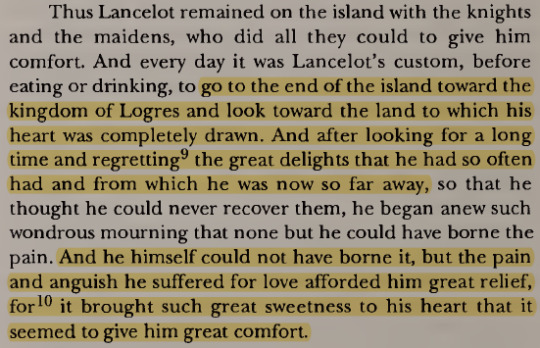
eventually, lancelot sends a secret message back to the land of logres intended to entice people to the island to fight him so he can relive the glory days.

in the end, it's lancelot's own half brother hector along with young and newly knighted perceval who find lancelot on the isle of joy. hector tells lancelot that the queen summons him, and lancelot immediately prepares to leave. on hearing this, galahad tells his grandfather he'll go and lodge in the abbey run by his great aunt, so that he might be nearer to his father. [Lancelot Part VI, Ch. 179 Hector and Perceval Find Lancelot, and They All Return to Camelot; Galahad’s Arrival Is Announced]
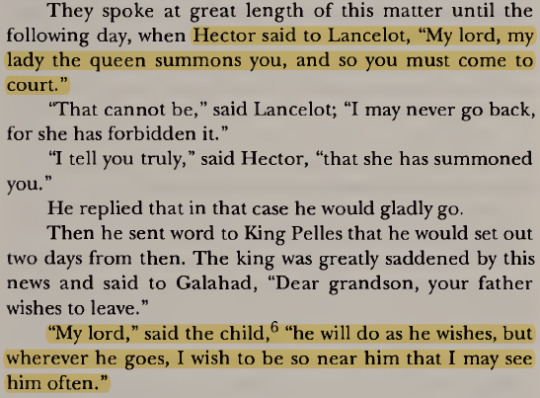
and with that, lancelot reenters society with his brother and son, which kicks off the grail quest in the subsequent book. that's a lot of info and reading, but all this to say that yeah, lancelot is known for his mental instability, to say the least. thanks for the ask!
#arthurian legend#arthurian legends#arthuriana#arthurian mythology#sir lancelot#lancelot#mental illness#ask#anonymous#my post
86 notes
·
View notes
Text
Getting in Mike's Head
Mike is a difficult character to understand, because his primary motivations have been intentionally concealed from the general audience. Fortunately, I'm insane and have been psychoanalyzing him for months, so here's a general analysis of that.
A few things to state before I begin. I'm writing this from the perspective of a gay mike truther, and a byler shipper. If you disagree with either of those I have no problems with you, but you're going to disagree with a fair amount of this analysis.
The main components of Mike's character are: He's gay in a small town during the satanic panic, he's traumatized and generally mentally ill but doesn't have anyone he knows he can rely on, and he's a paladin. All of these wrap around each other to make him suffer, and due to poor coping mechanisms makes those around him hurt too.
Mike's internalized homophobia
Many people have analyzed why Mike is gay, so I won't go into all of that here (i've left one such analysis below, but if anyone would like me to send some other analyses on that topic I would be happy to). However, I will state how it affects him. Mike's family is a typical republican family during this era. Thus, it's unlikely his family would in any way indicate being supportive, and rather likely they would be unsupportive (this is a tv show, so they likely will be supportive, but Mike doesn't know that). He's also seen his best friend since age 5 be bullied for being perceived as gay his whole life.
All of that is to say he definitely has internalized homophobia. I'll go into more detail later, but he definitely thinks he's "wrong" for being in love with Will. He also is (without meaning to) using Jane to hide that. I want to emphasize he does NOT intend to hurt Jane or use her, he's doing so by accident because of poor coping mechanisms.
Mike's Mental Illness
And that's another part of Mike, his poor coping mechanisms. He's just as traumatized as the rest of the cast, but he's doing far worse then most of them. We see in season 1 when he was fully acceptant of throwing himself off the cliff when Will was gone, Jane was gone, and Dustin was in danger. In season 2 he was referenced to have been acting out, but only got punished for it, no mental help.
In season 3 he threw himself into a relationship not based on communication and mutual respect, got himself in trouble for it and crippled his bonds with his friends so he could make out with a girl he doesn't even like that way. Before season 4 when Will and Jane moved away, he locked himself in his room and basement for a month of depression, and in season 4 takes the blame all on himself for both him and Will not staying in touch. Other people have also noticed Mike's possible eating disorder (link below).
All in all, Mike is definitely struggling, and is dealing with it (or rather, not dealing with it) through self-destruction. Whether or not you agree he's dealing with internalized homophobia is one thing (though I definitely think he is), but the fact of the matter is he's not doing well at all.
In addition to self-destruction, he also projects. With the rain fight with Will "it's not my fault you don't like girls" in season 3, with channeling feelings for Will in his "I love you speech" in season 4 (link below), he projects his own feelings onto others, or his feelings for Will onto Jane and vice versa.
And despite the jokes about Mike having rocks for brains, he doesn't underthink; he overthinks. Constantly trying to be a "normal" (straight) teenage boy, to his own detriment, terrified that others will see past the facade and know he's "broken".
Keeping the knowledge of his internalized homophobia and his mental illness in mind explains his quote unquote "toxic" behavior in seasons 3 and 4. He's still the same kid from seasons 1 and 2, things are just too hard for him to handle right now.
Despite It All, Mike is Still a Paladin
Before I go into why he's a paladin, I'll post some quotes on what paladins are like.
"The paladin is a holy knight, crusading in the name of good and order, ..."
"From 1st through 3rd edition, paladins were required to maintain the Lawful Good alignment... Failure to maintain a lawful good alignment or adhere to the code of conduct causes paladins to lose their paladin status and many of their special abilities until they are able to atone. "
(from 5th edition) "Oath of Devotion: paladins who appeal to the loftiest ideals of justice, virtue, and honor. Those who take this oath are typically Lawful Good, following the tenets of honesty, courage, compassion, honor, and duty."
(from Michael Tresca) "fighters of lawful alignment could become paladins from the outset and had a charisma score score of at least 17, positioning paladins as exemplary leaders. Their lawful allegiance was much stricter than other classes [...]. Where the cleric was more a healer and less a combatant, the paladin was more combatant and less healer"
While I'm no expert on D&D and have pulled the above quotes from the Paladin D&D page on wikipedia, given the time I would assume the characters would be playing either first or second edition. But regardless, all of the above indicate the character of a paladin. Often lawful good, a holy knight. A hero who does not succumb to evil (or does not break vows). A leader.
And we see that! Mike IS a leader, he cares about his friends, he is lawful good! At least, when his mental illness doesn't get in the way. His becoming less liked by the audience and decreased plot relevancy being simultaneous make me think that he's a fallen paladin right now. Just as the audience wants him to atone, his paladin status requires him to atone as well.
Why did I bring up the Oath of Devotion specifically? Because he values honesty and justice and honor, but it's very likely his devotion to Will at least partially shaped those values. "Friends don't lie" very possibly came from the character who has only lied once in the entire show, and barely so.
Mike's queerness, his love for Will both repulsing himself and shaping the core of who he is, Mike's overthinking and projection and self-destruction as a result of that and his other trauma, and Mike ultimately being a hero to defends what is good and is the heart of the party, his heart being powered by Will. All who he is wraps around itself, strangling and caressing in equal measure.
~~
Down here I have some posts that explain things above. If you want me to add posts explaining anything else, feel free to ask!
Mike's ED
Why Mike is gay, not bi (written pre-s4)
Mike's ILY speech to Jane doesn't actually fit her at all
(written for @dis-a-ppointment)
#stranger things#mike#byler#gay mike wheeler#posting about the prick#byler tumblr#analysis#byler analysis#mike wheeler#mikewheelerdefenseclub#mike wheeler protection squad#mike wheeler is gay#cleradin
75 notes
·
View notes
Note
hi! ❤ hope you are well, i'm so happy to know you liked my last robert analysis. it feels very safe and nice to write about him to you, so it makes me really glad that you're enjoying too. forgive me, it took me a while to write this one!
between the points you mentioned, what you said you think about his trauma got my attention first. what you think is right, and i thought it would be a good idea to help you with your conclusions if i explained robert's trauma in details.
to examine it closely, i separate robert's childhood trauma into three parts. i guess we could say he had three different childhood traumas. you probably remember it generally: rune experience, parents, and discrimination. each one was deeply connected to the others but had a different effect in some ways.
1- rune experience: it's kinda hard to people to understand what happened because its horribleness was complex. i'll try to summarize. it was robert's 12th birthday. first of all, robert was being burned alive non-stop. he wasn't having his flesh burned, he was something like "burning inside." how intense the pain was: it consumed his entire being, he lost the ability to think, the pain blocked any thought or memory he could have, so robert didn't know who he was, where he was or what was happening, because all his body/mind/soul were processing was the extreme pain. it was mortal pain, it was supposed to kill robert, he was supposed to die consumed but the burning pain. but it didn't. somehow, while he hadn't the ability to think or feel anything but pain, he had strenght to stay alive in pain instead of die. he was enduring something people shouldn't be able to survive to. in his state where his sould/mind was enduring differently of his body, there were demons, and they tortured robert physically and verbally. then, his family members appeared to him, basically saying he was worthless and should die. he really was supposed to be dead by then, and he could see it, he literally could see hell right waiting for him to finally expire. but it didn't happen. somehow he endured it. now, all of this, lasted one entire month. it's actually hard to imagine someone somehow enduring this for one entire month. i don't think any other character had to endure something like this, except maybe annabel. it's the worse i ever saw happen to a tsc character, it was an entire month. (it's very depressing how nobody could ever understand robert cuz no one else around survived something like this. annabel was tortured, buried alive and then painfully ressurrected, and went literally insane because of it.)
this had multiple consequences to robert. physically, he took a while to recover, but then it was stated his body was fine. the effects were mostly mental. after receiving his first rune, robert was supposed to continue his training, but he couldn't. other kids of his age were evolving their training, while he was doing nothing about it. he both hadn't the energy and couldn't do it, cuz he was afraid of steeles. something perfectly logical since a steele caused that month of agony. you know he eventually managed to learn to use steeles to be an actual shadowhunter. but it wasn't all.
the first rune is something normal that happens to all shadowhunters, and it's mostly something good. the way it was horrible to robert in a way no one could have expected, made robert develop extreme anxiety; because the worst happened to him triggered by something common. so while doing common things, robert would be always scared and anxious, thinking about the worst of the worst that could happen. while it wasn't much notable to other people, it harmed his development and behavior a lot, consequently harming his self-steem, cuz he couldn't do things right, he was always worried and overthinking everything.
to compensate it, robert became somebody who worked on two extremes: he was always overthinking everything, except in battle. in battle he wasn't what we define as brave i guess. he was fearless. valentine is the one who helped robert to achieve that. (we know his actual motivations, this isn't important now) the mental process valentine taught him was: robert's inherent fear and anxiety made him fail, and that made him despise himself (that's something robert does a lot for countless reasons). robert should not only embrace the fury he felt against himself, but it should dominate him, and he use its intensity to block his fear. then basically, robert should do a mental form of self harm, letting the strenght of his hate for himself take his mind and use this strenght to control his actions. robert's fury leading his actions, not his fear and anxiety. as expected with this process, robert then was able to engage in normal shadowhunter activities, but fearless when it came to physical risk. logically this would be very dangerous, but we can imagine how useful it was for valentine to have on his team a warrior like this who was such a big and strong man and centainly could take a lot of physical damage and pain (and i guess it shouldn't be any doubt that being so tough helped robert a lot to survive through the years). we know it was because of this robert felt he owed loyalty to valentine.
2- parents: first, something kinda interesting is that robert had other relatives and they were there when robert's first rune was made. we are informed that his state during that month of agony was a scandal and robert's parents were the ones being absurd. so we can assume his other relatives had nothing to do with it. another strong evidence is robert naming two of his children with names from his family, what indicates he didn't saw his entire family negatively. now his parents... let's never forget what happened to robert was supposed to kill him on incredible intense pain. andrew and phoebe deliberately let their child to die in pain so he wouldn't be a mundane. i personally classify them between the worst shadowhunters parents along with céline's, annabel's, valentine and tatiana.
after robert woke up, they (or anyone else) never cared to ask robert how he felt. all they wanted was to make everything seem normal, without caring about how robert was taking it. they never showed any regret about what they've done: they did the opposite of that, telling robert right on his face what they did and how they were sure that it was totally worth it to make him go through that to not be a mundane. it hurt (and traumatized) robert a lot.
love from parents and relatives is supposed to be the first love someone gets. and robert didn't have that. if his parents showed love to him on his first years alive, it never mattered because these two traumas mentioned made robert forget anything about his parents from before his first rune. he couldn't ever remember them as actual parental figures of love. the only parents he remembered and recognized were the ones who left him to endure that, looked proud of it and never cared about its effects on him afterwards. as far as it counted, robert lived a loveless childhood. as i mentioned, andrew and phoebe wanted everything to be as normal possible, so they just acted as robert's parents as if anything happened, but it was pointless and felt cold. after knowing what they did to him (what they let happen to him), knowing that they didn't actually love him as their child, robert couldn't have a bond with them, he couldn't even be comfortable around them. it's described that their presence was what intensified robert's loneliness the most. so he didn't spend much time around them, he stayed in his room.
without his parents' love, robert's first experience with love was when he was 13 years old, with michael. it was setting a standard of love to him, with the long-term consequences afterwards being devastating. (i guess someone could even connect robert not recognizing his parents affection with his future performance of fatherhood, but that would be mostly guessing and i rather work with things i can prove. another good guess i think would be connecting his loveless childhood to how robert during his teenagehood had messy limits between his love for michael and his affection for maryse and didn't know how to handle or recognize it. i mean mostly things like, if michael was robert's best friend/parabatai and maryse his romantic partner and probably future wife, why did robert see maryse and women in general as a threat to michael's place in his life and their parabatai and best friend relationship? he saw valentine having a parabatai he loved and a girlfriend he wanted to get married to, and still freaked out about a woman as his wife replacing michael who was his parabatai, what didn't make any sense. i know people joke about robert being "clueless" about michael but it isn't much funny with this context. finally, another guess would be connecting robert's discovery that his parents' love for him was faulty through they letting him hurt to his beliefs that what he did to michael proved his love for michael was faulty. you can deliberate about all of these conjectures if you want).
3- discrimination: before his first rune, robert had other kids to play with, but he wouldn't remember much of it. yeah, we can say robert doesn't remember anything about how he was treated by people before his first rune. robert doesn't know a life without trauma.
since what happened to robert was a political scandal, with everyone trying to save robert and his parents wanting him to keep his painful and mortal rune, what happened to him was kind of general knowledge. then, no kid wanted to play or train with him. at first he was still recovering, but then he couldn't move foward because he didn't have anyone. he didn't want to be around his parents' coldness and no one else wanted to be around him, quite literally. other people would be around him only when being forced, and then would stay the most distant of him possible, to never get physically close of him, as if to not catch a disease. this is absolutely dreadful to a child.
being treated like this hurt and traumatized robert terribly. being around any one was horrible, so he spent most of the time hidden in his room. not being able to improve on anything because of his fears and anxiety and not having anyone to train with or even to socialize with, and basically never being able to move on about what happened, robert hated to be alive and wished to be dead, wished the rune had killed him as it should have, because he thought no death could be worse than his life, so be dead would be better. this state of mind dured an entire year before michael came around. a lot of damage had been done by then.
being treated like he was "sick" and ostracized left a huge psychological wound on him. to him, discrimination was one of the worst things ever, for something that was never his fault and he never choose to.
(one may think that if robert hates discrimination, it doesn't make sense to him to dislike downworlders, but it actually does. all robert wanted was to be a normal shadowhunter, and he had deeper reasons than most to be passionate about being one. disliking downworlders would be an ideal average shadowhunter thing to do. but robert was far from ignorant. he didn't think downworlders were animals or demons and was far more inclined to defend downworlder segregation than downworlder extermination. of course segregation is something horrible in general and should never be defended, but with downworlders being different sub-species, it wasn't as absurd as the extermination valentine defended, and robert being actually smart and open minded, we know he actually changed his beliefs).
now, to him, one being discriminated by their peers was one of the worst things that could happen, and the perspective of being discriminated terrified and triggered robert deeply. we know the perspective of homosexuality freaks robert out because of the discrimination, marginalization and "anormality" experience that comes with it (and robert is a 60s kid and shadowhunter society is a conservative mess, so it would naturally seem so much more taboo to him), what scared him deeply. we see him getting extremely anxious over himself, michael and alec about the perspective of homophobic discrimination.
robert only started training with runes after his 14th birthday. his training was late, and between his 12th and 14th birthdays, half of the time was extremely traumatizing, the other half he spent most with michael (who helped him a lot about everything). but still, it was a very big share of his childhood-teenagehood and he didn't have the feeling or normality. everything i said about his anxiety over shadowhunting, specially over runes, applied intensely during his entire teenagehood, but robert went to the academy with michael where he was having normal training and final got to socialize a little. he loved so much to feel a little normal. he still felt like a weak and useless trash, but at least he was doing normal shadowhunting things and living like a teenager. the problem was: he wanted to live his entire teenagehood, and he just couldn't do that. training is supposed to end when shadowhunters are 18 years old. robert would stay at the academy until he was 19, and still didn't seem enough. while he was older than his fellows, he felt far less mature. much of his development time had been lost, and he would never get it back. in this context, it made very sense to robert's girlfriend be a younger girl and his admiration for a younger boy (valentine), and there were jokes about him being old, but what bothered robert the most was that he should soon live an adult man average life with wife and kids, when his perspective of life was being with michael in the academy. we also know how that went... and he married maryse when he was about 21/22 years old and maryse about 19.
forgive me for any grammar mistakes. i think this summary can help a lot! at least i hope it's useful to you or anyone else who read it! writing it was very thoughtful (and it's really a huge joy for me to explain things about robert, if you haven't guessed) and i hope to start working on my next ask soon
xoxo, take care of yourself, kind fellow ☺ thank you for your attention
First of all,. I'm sorry for getting to this late.
Second, I don't think I need to add anything. This is written very well, and gave me a deeper understanding.
And I am once again saying: let Shadowhunters get help with their trauma 😭
Also, TSC has a lot of bad parents. But it sadly represents real life 😔
Thank you for taking the time to write this out. I enjoyed reading it. And I agree with a lot that was said.
21 notes
·
View notes